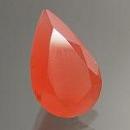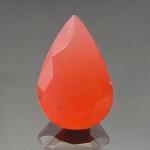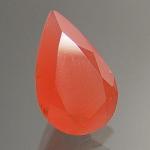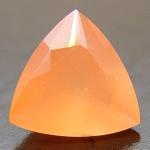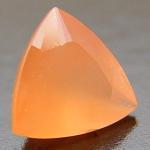|
|
||||||||||||||||
|
||||||||||||||||
|
||||||
|
|
|
|
Bustamite
|
|
| | |
| Discovered in 1822; IMA status: Valid (pre-IMA; Grandfathered) | ||
|
| ||
|
Chemistry |
|
|
| |
|
(Mn,Ca)3Si3O9 | |
|
|
Manganese Calcium Silicate |
|
Molecular Weight: |
381.92 gm |
|
Composition: |
Calcium |
7.87 % |
Ca |
11.01 % |
CaO |
|
|
Manganese |
32.37 % |
Mn |
41.79 % |
MnO |
|
|
Silicon |
22.06 % |
Si |
47.20 % |
SiO2 |
|
|
Oxygen |
37.70 % |
O |
|
|
|
|
|
100.00 % |
|
100.00 % |
= TOTAL OXIDE |
|
|
|
||||
|
Classification |
|
|
| |
|
Silicates (Germanates) | |
|
8/F.18-40 | |
|
|
9 : SILICATES (Germanates)
|
|
Related to: |
Wollastonite Group. The Mn analogue of Ferrobustamite. |
|
Members of Group: |
Wollastonite Group: Bustamite, Ferrobustamite, Pectolite, Serandite, Tanohataite, Wollastonite |
|
Varieties: |
None |
|
Synonyms: |
Buchstamite |
|
|
|
|
Crystal Data |
|
|
|
|
|
Crystals prismatic, needlelike, to 2.5 cm, or tabular; commonly fibrous, cleavable massive. Twinning: Composition plane, simple twins, uncommon. |
|
|
None |
|
|
|
|
|
Physical Properties |
|
|
|
|
|
Perfect on {100}, Good on {110} and {110}, Poor on {010} |
|
|
Sub-Conchoidal |
|
|
Brittle |
|
|
5.5 - 6.5 |
|
|
3.32 - 3.43 (g/cm3) |
|
|
Fluorescent. Deep Magenta-Red under SW UV and LW UV |
|
|
Not Radioactive |
|
|
|
|
|
Optical Properties |
|
|
|
|
|
Brown red, Light pink, Pink |
|
|
Transparent to Translucent |
|
|
Vitreous |
|
|
1.640 - 1.710 Biaxial ( - ) |
|
|
0.013 - 0.015 |
|
|
Weak |
|
|
X = Z = orange; Y = rose |
|
|
|
|
|
Occurances |
|
|
|
|
|
Geological Setting: |
In manganese ores formed by metamorphism of manganese-bearing sediments with attendant metasomatism; typically associated with skarns. |
|
Common Associations: |
Rhodonite, Tephroite, Calcite, Glaucochroite, Johannsenite, Wollastonite, Diopside, Grossular. |
|
Common Impurities: |
Mg, Zn, Fe |
|
Type Locality: |
Tetela de Ocampo, Hidalgo, Mexico |
|
Year Discovered: |
1822 |
|
View mineral photos: | |
|
|
|
|
More Information |
|
|
|
|
|
| |
|
|
|
|
Sources
of Bustamite are the "type material", from
Tetela de Ocampo, Hidalgo, Mexico, is a mixture; well-studied
material from other localities includes: in the USA,
at Franklin, Sussex County, New Jersey. At Lĺngban and
in the Harstigen mine, near Persberg, Värmland, Sweden.
At the Treburland mine, Altarnun, Cornwall, and in the
Railroad quarry, Meldon, near Okehampton, Devon, England.
At Camas Malag, Isle of Skye, Scotland. From Baita (Rézbánya),
Romania. At Campiglia, Tuscany, and Schio, Vicenza,
Italy. From the N'Chwaning mine, near Kuruman, Cape
Province, South Africa. In Australia, at Broken Hill,
New South Wales. From the Obori mine, Yamagata Prefecture;
the Noda-Tamagawa mine, Iwate Prefecture; the Kanoiri
mine, Tochigi Prefecture; the Mikumo mine, Shiga Prefecture;
and the Hijikuzu mine, Iwate Prefecture, Japan. |
|
|
||||||||||||||||||||||||||||||||||||||||||||||||||||||
